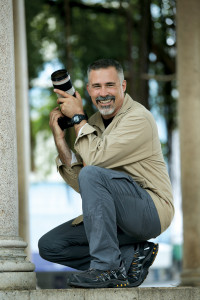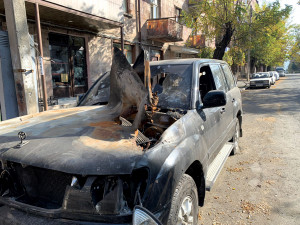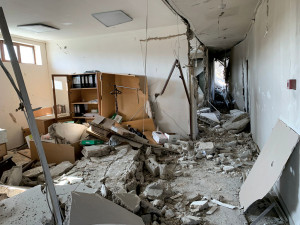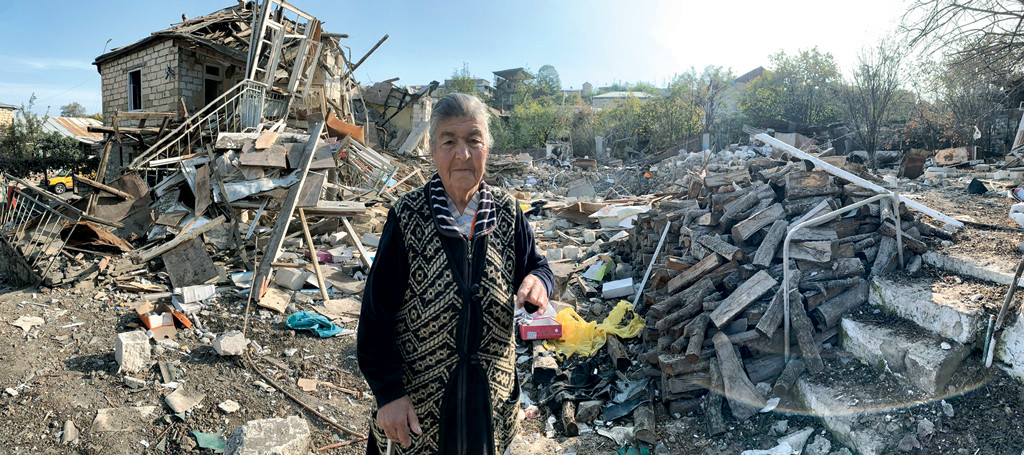IN THE HOTTEST ZONES OF THE WORLD
 “I have led men in combat, piloted helicopters, invested in the stock market, traveled to distant lands, set up businesses, sold and had successes and losses during that time. But for me, none of this can be compared to being a father. My ministry helps other fathers in the most noble endeavor on earth, the upbringing of God-fearing men. ”
“I have led men in combat, piloted helicopters, invested in the stock market, traveled to distant lands, set up businesses, sold and had successes and losses during that time. But for me, none of this can be compared to being a father. My ministry helps other fathers in the most noble endeavor on earth, the upbringing of God-fearing men. ”
CHUCK HOLTON
Chuck Holton is a freelance war journalist. Since 2003 he has been reporting for the Christian Broadcasting Network, the Christian Broadcasting Network and other news outlets. Holton has traveled extensively as an operator. 2012-2018 hosted an online TV show called Life of Duty. Frontlines: “Life in the service. In addition, he has published an online blog entitled “Boots on the Ground”, where he discusses issues related to the morale of wars and troops in the Middle East. 2018 Recently, he launched a website with the caption “Hot Zone with Chuck Holton”. During the 44-day war, Chuck Holton was on the front lines of Artsakh, documenting the events of the “hottest” days of the war. We talked about all this with the military journalist.
– I have traveled in more than 20 different countries, we can say that in all “hot” places: Afghanistan, Syria, Iraq, Venezuela, I came to Armenia in October 2020. I was contacted in the United States by an Armenian woman, Anna Astvatsatryan, who told me a little about this conflict. I learned from the interview with him that Armenia has problems with Azerbaijan. I have been running the “Hot Zone” for 20 years and I did not know anything about Armenia at all. I did not even know that Armenia is a Christian country. When I learned that Armenia is a Christian country, I thought that there are many Christians in the United States who might be interested in these issues, but in reality they know nothing. In the United States, I am a partner with the Christian Broadcasting Network. I talked to the director of news, he told me. “It’s a very interesting story. Why don’t you go to cover it? ” That’s how I came to Armenia, went to Artsakh, filmed everything I saw. During that time I learned a lot more about Armenia, people, history, culture, food, I fell in love with Armenia. It is a very beautiful country, it has a very interesting history. People are very kind, you feel completely safe, secure, life is not expensive at all. And when I returned to the United States, it turned out that I was one of the few American journalists to cover this war. I received many interview offers from other news agencies. In one of them, during an interview with an Armenian agency in California, I said that I would love to go to Artsakh again and present everything that is happening there. They encouraged me. They said that they would be able to raise the necessary financial aid so that I could go back and make a feature-length documentary about it. One of the drawbacks of my work is that I often do not have time to look deeper into the problem. But this time it worked. I was able to come back. I have seen so many wars and disasters in my life that I had to look at it all through the eyes of a man who had never seen a war. I decided to bring my teenage daughter with her boyfriend in January.
– How was this war different from the other wars you saw?
– Every war has its peculiarity. The unusual thing about this one was that Turkey and Azerbaijan were fighting against a very small Armenia, and these two countries together were so big that they could easily go to the battlefield against Armenia, but they were bombing the Armenians from the air with both drones and by planes or artillery. Was this a man’s war on their part?
– In your opinion, why was that?
– They have no sense of honor. They bombed civilian infrastructure, people’s homes. Your young people were fighting for their existence, for their Homeland. They defended themselves and the Turks and Azeris attacked to take the lands that belonged to Artsakh. If the two sides came out against each other in units, they would inflict much more casualties. But it was much easier for them to bomb from a distance.
– You were in Artsakh when those bombings were taking place on Armenian cities. What did you see with your own eyes?
– Yes, of course, I have seen a lot. I was once standing near a hotel not far from the church in Stepanakert, half a mile from the hospital, when they bombed the hospital. I shot it. I saw not only the destruction of the hospital, but also the destruction of the substation. We were driving around after the bombing and we also saw the collapse of civilian houses. That day we met two grandmothers whose houses had collapsed. They were just locals, they could not threaten the Azerbaijanis with anything. Did the Azerbaijanis consider them a threat? Their terrorist acts were dishonorable and intentional. This is not a war crime, but a crime against humanity. With facts about all this the international community should be informed. This is what I’m trying to do.
 – You have witnessed how Azerbaijan has used internationally banned weapons – cluster bombs, white phosphorus.
– You have witnessed how Azerbaijan has used internationally banned weapons – cluster bombs, white phosphorus.
– To be completely unbiased, to be honest, these weapons are not actually banned for countries that have not signed international agreements banning the use of these weapons. But using white phosphorus against civilians is the same as using chemical weapons. It is immoral, inhuman, dishonorable. Nothing can stop a country like Azerbaijan, which is quite far from civilization. Hospitals should not be targeted by the Declaration of Birth. But, for example, the Taliban in Afghanistan are constantly doing just that because they are not a party to the Geneva Conventions. That is why Azerbaijan does not care that other countries have agreed not to use cluster bombs. But Turkey is a different story. Turkey is a member of NATO. But they also say. “I did not use, but Azerbaijan.” The same thing they did against the Syrian army. When in 2019 I was in Syria, it was in November 2020, I saw the same people who were in Artsakh in September-October, I saw them there. I assure you, these people are ruthless, immoral, dishonorable, cowards, this is the only explanation that they are fighting by those means.
– Weren’t they trying not only to harm civilians, but also to cause as much damage to the military as possible? Make their future lives a torment. After the war, I saw two-legged, one-armed soldiers with terrible burns.
– The war is full of these horrors. They use the most powerful weapons to win. And, I want to explain the logic. It is more effective when you seriously injure your opponent than when you kill. After all, when you insult, you take out one or two soldiers who take him off the battlefield. This ensures that as many soldiers as possible leave the battlefield. But the biggest problem is that they were not only throwing bombs at the military, but also at schools, hospitals, playgrounds. When I saw this with my own eyes, I decided that the world should know what they were doing to the Armenians. I understand that many people in Armenia are angry with Israel, I understand why. because the latter supported Azerbaijan during the war. Many in the United States support Israel because there are so many Christians there. The Holy Gospel tells us: “If you bless Israel, you bless yourself.” They see that Israel is surrounded on all sides by enemies who want to wipe them off the face of the earth. And we want to support Israel so that it can survive. My opinion is that if we support Israel, we should support Armenia much more, because it is surrounded by more enemies. I am sure that Christians in the United States will support Armenians if they know more about Armenia. To that end, I decided to bring some Christian Americans to Armenia to see Armenia with their own eyes. And all week that we are here, they keep saying. “We had no idea what Armenia was, how beautiful it was, what Armenians were going through.” I am now trying to make Armenia known to as many people as possible.
– Have you been to the Genocide Museum?
– Yes, on the very first day. These days I’re reading a book I bought from a museum. It is called “Ravaged Armenia”. It is the story of Aurora Mardiganyan. An amazing story I had no idea about. I had heard about the Armenian Genocide before, but I did not know the details. I knew that the Ottoman Empire first disarmed and then annihilated the Armenians. And it is possible that they could not have committed genocide if the Armenians were armed.
 – You were in Artsakh, you communicated with the Armenians there. What is your impression of the people? What interesting stories did you manage to hear and document?
– You were in Artsakh, you communicated with the Armenians there. What is your impression of the people? What interesting stories did you manage to hear and document?
– We went to see one of the houses that was destroyed by the rocket. We saw only a huge hole on the spot. All around the houses were also destroyed. there were only piles of stones left. We walked around those piles of stones and filmed. An old grandmother appeared from those piles. I did not even understand where she came from. I think she was 84 years old. She lived alone in one of the ruins that was once her home. There was no window, no door… Only two rooms were more or less standing. Curtains were hung instead of the door. She stayed there. It was January. It was very cold. Inside was a small electric hob to heat the area and cook on it. She told her story and many other horror stories, how she survived, how she survived several wars full of losses. And now she was entrusted to the generosity of her neighbors, to their care. She said. “I am scared because I do not have a door. “Anyone can enter my house.” We gave her some money to at least open the door. But I’m afraid she was going to give that money for food… This time we wanted to go and help the victims, the grandmother in the matter of the house. Unfortunately, we could not get permission to go there again from the Artsakh Ministry of Foreign Affairs.
– I do not think that Artsakh did not allow it, but the problem is mostly in the conditions set by Azerbaijan.
– They did not explain to us why. In any case, it is again a very cowardly practice on their part.
– Yes, on the same principle that Azerbaijan did not allow foreign journalists to come to the frontline, saying that it was very dangerous there.
The only reason they refused was because they were going to try to attack me. I have the impression that they are more afraid of me than I am of them. Why, we could not go there this time. Instead, we tried to help the refugees in Armenia. We visited the families of wounded and killed servicemen. In Etchmiadzin, for example, we met a family whose only foster father became disabled during the war. They had to mortgage their house. We paid for the house and took it out as collateral. I know there are thousands of such families now, and we may be able to provide more help in the near future.
– We have many refugees from the Hadrut region of Artsakh, which has always been inhabited exclusively by Armenians, who have lost everything.
– Last time we met families from Shushi. We also managed to help them. In short, we are trying to help as many families as possible who have suffered great losses in this war. We pray to God to send us to the very people who need the most help right now, who are in danger of being left on the street. We want to change the situation in which they find themselves, to give them a chance to start a new life. We visited a family whose father had died and whose wife had a child after the war. We will help them in any way we can. There are many people in the United States, Christians, to whom when I start telling my eyewitness observations, they say: “We did not know that our Christian brothers and sisters are suffering in this way in Armenia. We want to help them.”
But the biggest help I can give today, I think, is to air my documentary so that millions of people can see it and do more for Armenia than I can do alone. Over the years, I have come to believe that by covering human destinies in wars on television, I can help to change these situations to some extent. Americans are very generous, and if they know someone is in need, they are ready to help. But someone has to tell them all about it. Here is what I do.
– Thank you for the interview, for everything you did during the war, risking your life, are you doing today? Is there anything you would like to add at the end of our interview?
– I bought a bottle of wine from the winery of Togh village, which does not exist today! I will take it home and open it when Artsakh is free. Long life to Artsakh. God bless (says in Armenian).
By KNAR TADEVOSYAN
Photo from Chuck Holton’s personal archive
Category: #19 (1390) 19.05.2021 - 25.05.2021, Army and Society, Spotlight











